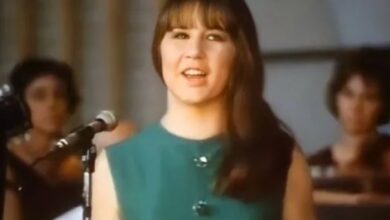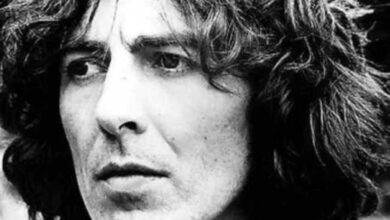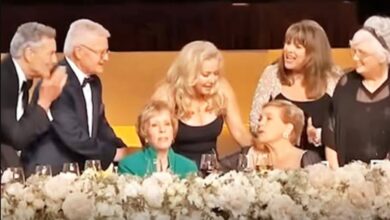AURORA’s Mesmerizing Rendition of ‘Across The Universe’ Captivates the World
Inside the studio for Like A Version, AURORA sat before her keyboard, streaks of pink painted delicately beneath her eyes, and an air of calm anticipation surrounding her. Known for her celestial voice and atmospheric artistry, the Norwegian singer was preparing to reinterpret one of the most beloved songs ever written. As she began her version of The Beatles’ “Across The Universe,” fans held their breath, wondering how her ethereal touch would transform a song so revered for its timeless sound and spiritual grace.
From the first note, it was clear that AURORA wasn’t merely covering the classic—she was inhabiting it. Her voice floated gently, weaving through tender harmonies that shimmered like light through glass. With soft piano tones anchoring her dreamlike delivery, she turned the familiar melody into something transcendent. It was as if the song itself had drifted into another dimension, glowing with quiet beauty. Listeners across the globe found themselves enchanted by how naturally her mystical sound fused with Lennon’s lyrics.
The reaction was instantaneous and overwhelming. Fans flooded the comments section, calling it one of the most hauntingly beautiful performances they had ever heard. “My entire heart just opened up,” one viewer wrote, echoing the sentiments of thousands. Within days, her rendition was voted among the greatest Like A Version covers ever recorded. The video’s reach soared past 2.7 million views, with listeners describing the experience as “spiritual,” “otherworldly,” and “a reminder that magic still exists in music.”
Part of what made this performance extraordinary was AURORA’s ability to honor the original while completely transforming it. She didn’t attempt to imitate Lennon’s tone or Bowie’s earlier 1975 rendition, which had been met with critical division. Instead, she chose intimacy over imitation—letting the song breathe through her otherworldly phrasing. Each lyric was treated as sacred, yet renewed. By the time she whispered the final “Nothing’s gonna change my world,” the audience knew they had witnessed something unforgettable.
Her decision to tackle a piece so iconic carried both risk and reverence. Many artists shy away from The Beatles’ catalog precisely because of the impossibility of living up to its legacy. But AURORA’s courage paid off in full. She brought emotion where others brought imitation, honesty where others brought homage. What emerged was not a recreation but a rebirth—one that bridged the cosmic wonder of the 1960s with the emotional vulnerability of a new generation.
The cover resonated because it embodied AURORA’s essence: a fusion of innocence, power, and transcendence. Her whisper-light voice carried the depth of oceans, and her subtle gestures spoke louder than theatrics ever could. It felt deeply personal, yet universal. The stillness in her delivery made every word feel like a prayer. The studio lights dimmed around her, and for a few minutes, even time seemed to slow, surrendering to the hypnotic beauty she created in that space.
To millions watching online, the performance became a meditation on stillness, vulnerability, and artistic courage. It reminded listeners that great art doesn’t shout—it breathes. Through this version, AURORA proved that true reinterpretation is not about embellishment but transformation. “Across The Universe” had been sung by countless voices before her, yet none had sounded quite like this: fragile but fearless, pure yet haunting, the kind of sound that lingers long after silence returns.
What made her bravery even more remarkable was the shadow of David Bowie’s own 1975 cover—a version that critics had once dismissed as too forced. By contrast, AURORA’s take felt effortless, a natural extension of her artistry. She managed to achieve what few could: breathe new life into a song that had long been considered untouchable. Viewers quickly noticed the irony that one of the most innovative artists in history had stumbled where AURORA now soared. It was a quiet, poetic victory.
Her Like A Version session also included an intimate performance of her original song “The Seed,” a perfect companion piece to her Beatles cover. With its environmental message and mystical tone, it showcased her deep understanding of how sound can carry emotion beyond words. Switching seamlessly from ethereal calm to visceral urgency, AURORA reminded audiences that her artistry is not confined to covers—her own creations are equally capable of evoking awe and reflection.
Taking on The Beatles is something few attempt and even fewer succeed at, but AURORA’s success only reinforced her reputation as one of the most captivating performers of her generation. Her growing list of achievements—performing at Wembley Stadium, earning the Silver Clef Award for Contemporary Music, and landing on Forbes’ 30 Under 30—speaks to her rare combination of skill and sincerity. Her work resonates because it feels alive, untouched by industry artifice or imitation.
In every performance, AURORA manages to blend fragility with strength, crafting soundscapes that seem to exist somewhere between waking and dreaming. With “Across The Universe,” she created not just a cover but a living experience—something that felt both nostalgic and brand new. Her art invites listeners to step out of time, to feel more deeply, to remember that music can still surprise even the most seasoned ears.
Her Like A Version appearance also reaffirmed why her voice has become one of the most distinctive in modern music. She doesn’t chase perfection; she chases emotion. Her phrasing, filled with breath and wonder, captures the spirit of connection that “Across The Universe” was always meant to convey. By stripping away everything unnecessary, she revealed the core of the song: stillness, surrender, and the infinite nature of love.
For fans, this performance served as both revelation and reminder—a glimpse into what happens when art meets authenticity. The song’s timeless message found new resonance in her voice, proving that great music doesn’t age; it evolves. AURORA became a bridge between eras, uniting past and present, sound and silence, with a quiet power that few could match. Her take didn’t just honor The Beatles—it expanded their universe a little further.
Long after the final note faded, listeners were still captivated, replaying the video like a mantra. “This must be the most beautiful thing my ears have ever had the pleasure to listen to,” wrote one viewer—a sentiment shared by millions. In a world saturated with noise, AURORA’s “Across The Universe” stood out as a moment of pure clarity, a reminder that when music meets soul, even the quietest sound can echo forever.





